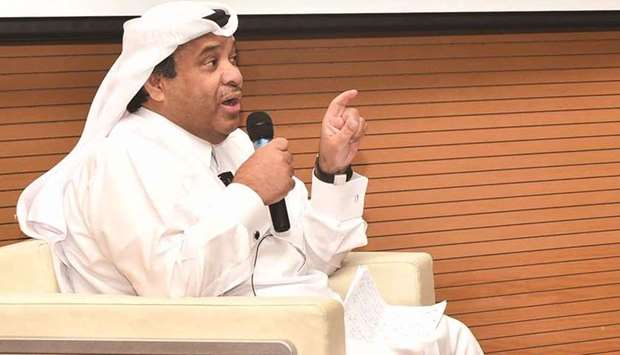The Qatari Authors Café at Qatar University (QU) recently held a weekly episode under the title 'Historical Glimpses of Culture and Arts in Qatar'.
The event was organised by the Department of Culture and Arts in the Student Activities Department in co-operation with the Qatar Authors Forum.
Well known artist Dr Saad Burshid spoke on the early days of Qatari culture, which he said dates back to the era of the founder, and is an extension of the ancient Arab-Islamic culture.
"The Qatari people are closely linked to their Arab-Islamic culture, and it is a conservative society. Therefore, culture in Qatar was limited to the arts of poetry and rhetoric. The founder, Sheikh Jassim bin Muhammad al-Thani, was a poet, storyteller and judge who collected all the cultural arts during his reign. Thus, his poetry has often been cited in Qatar during its modern history and until today.
“There are purely Qatari arts, such as the art of Al-Ardah, which is one of the ancient and inherited folk arts, and the art of Al-Muradah. There are other arts that have been associated with certain environments, such as “Al-Nahma”, where the nahma was associated with the sea. It is one of the folk arts associated with pearl fishing bearings to ease the difficulties of sailors and enable them, by repeating it, to carry the heavy weight of the bearings. The bearings are carried by 20 men chanting a single musical sound and helps them bear the weight.”
Dr Burshid spoke about the emergence of schools in Qatar since the beginning of the 20th century through the establishment of a religious school by the ruler of Qatar.
Later, the Qatar Primary School Al-Hamdiya was founded by the founder’s grandson, but the educational stage did not start until the fifties, when an active educational movement emerged after Qatar opened up to its Arab surroundings, and cultural and sports clubs appeared with Arab names linked to the Arab liberation movement and the national tide, such as: Al-Uruba Club, Al-Wahda Club, and Al-Tahrir. There was a strong desire among Qatari youth to gain more knowledge on Arab culture and education and not focus on sports clubs only.
"The educational and cultural activities in Qatar during the sixties and seventies culminated in great and unlimited support after the independence of Qatar, which we witness today as Qatar has become a cultural and sports beacon at the global level."
Professor Abdullah Hamed al-Mulla, director of Student Activities, said: “We at Qatar University are pleased with this distinguished co-operation with the Qatar Authors Forum, which resulted in the establishment of the 'Authors Café' cultural platform. It represents a great opportunity for our students and the university community in general to learn about various ideas and opinions, and have constructive dialogue in matters of culture, thought, literature and the arts of all kinds."
Well known artist Dr Saad Burshid spoke on the early days of Qatari culture, which he said dates back to the era of the founder, and is an extension of the ancient Arab-Islamic culture.
"The Qatari people are closely linked to their Arab-Islamic culture, and it is a conservative society. Therefore, culture in Qatar was limited to the arts of poetry and rhetoric. The founder, Sheikh Jassim bin Muhammad al-Thani, was a poet, storyteller and judge who collected all the cultural arts during his reign. Thus, his poetry has often been cited in Qatar during its modern history and until today.
“There are purely Qatari arts, such as the art of Al-Ardah, which is one of the ancient and inherited folk arts, and the art of Al-Muradah. There are other arts that have been associated with certain environments, such as “Al-Nahma”, where the nahma was associated with the sea. It is one of the folk arts associated with pearl fishing bearings to ease the difficulties of sailors and enable them, by repeating it, to carry the heavy weight of the bearings. The bearings are carried by 20 men chanting a single musical sound and helps them bear the weight.”
Dr Burshid spoke about the emergence of schools in Qatar since the beginning of the 20th century through the establishment of a religious school by the ruler of Qatar.
Later, the Qatar Primary School Al-Hamdiya was founded by the founder’s grandson, but the educational stage did not start until the fifties, when an active educational movement emerged after Qatar opened up to its Arab surroundings, and cultural and sports clubs appeared with Arab names linked to the Arab liberation movement and the national tide, such as: Al-Uruba Club, Al-Wahda Club, and Al-Tahrir. There was a strong desire among Qatari youth to gain more knowledge on Arab culture and education and not focus on sports clubs only.
"The educational and cultural activities in Qatar during the sixties and seventies culminated in great and unlimited support after the independence of Qatar, which we witness today as Qatar has become a cultural and sports beacon at the global level."
Professor Abdullah Hamed al-Mulla, director of Student Activities, said: “We at Qatar University are pleased with this distinguished co-operation with the Qatar Authors Forum, which resulted in the establishment of the 'Authors Café' cultural platform. It represents a great opportunity for our students and the university community in general to learn about various ideas and opinions, and have constructive dialogue in matters of culture, thought, literature and the arts of all kinds."

